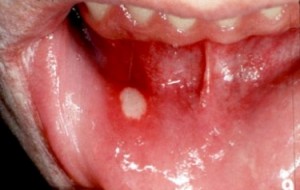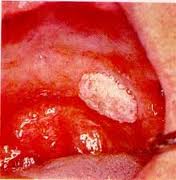Category: Questions & Answers
Questions and answers that patients ask about the range of dental treatments available from blue court dental centre, here in Harrow.
Top tips for people with sensitive teeth
Bad Breath Causes, Treatment and Prevention
Mouth Ulcers – causes, treatment and symptoms
Mouth Ulcers
Mouth ulcers are small painful sores that form in the mouth. The most common type is called aphthous or simple ulcers.
There are three main types of ulcers:
- Minor ulcers are small, non-scarring and usually heal without any treatment within two weeks.
- Major ulcers are 1cm or larger, have a raised border and can last from two weeks to several months. Usually only one or two appear at a time. They can be very painful and cause difficulty eating, are slower to heal and can leave scars.
- Herpetiform ulcers are multiple tiny sores that can be very painful, particularly if they fuse together to form one larger sore. They can last from one week to two months.
Who’s at risk from ulcers?
Most people have at least one attack of mouth ulcers in their lifetime, but mouth ulcers are more common in women and those under the age of 40. Up to one in five people have repeated attacks of mouth ulcers.
More than a third of people with recurrent mouth ulcers have a family history of it. This figure rises to over 80% if both parents get frequent mouth ulcers.
What causes mouth ulcers?
Minor mouth ulcers are usually caused by:
- Damage to the inside lining of your mouth by very hot or acidic food or drink
- Biting your inner cheeks
- Brushing your teeth and gums very hard
- Poorly fitted dentures or orthodontic appliances (braces)
- A very dry mouth due to a medical condition
- Eating food to which you are allergic
- Trauma from food like crusty bread and crisps
- Stress, or lacking vitamins or minerals
- Certain medications
Certain medical conditions can also make mouth ulcers more likely, such as:
- Vitamin B12 deficiency
- Viral infections
- Iron deficiency
- Celiac disease ( intolerance to a protein called gluten )
- Crohn’s disease
- HIV infection
What are the symptoms?
Most mouth ulcers are easy to spot because they are round or oval in shape, whitish in colour and inflamed around the edge.
They are usually seen on the inside of the lips and cheeks, on the floor of the mouth and under the tongue.
Treatment of mouth ulcers
Most mouth ulcers do not need specific treatment and heal naturally without medication. Mouth ulcers usually heal within 7 – 14 days, however treatment can help to numb the pain, protect the ulcer from further damage and decrease the chances of a bacterial infection. Some medicines may also speed up the healing if used early.
In a very small number of cases, ulcers may be a sign of mouth cancer. The recovery rate for mouth cancer is good if spotted early enough, so you should get any persistent mouth ulcers checked out and have regular check-ups with your dentist. We offer a mouth cancer screening service, if you are concerned or interested please do contact us.
Mouth Cancer Awareness Week – Have you Been Checked?
This week (11th-17th November) is Mouth Cancer Awareness Week.
What is mouth cancer?
 Mouth cancer is caused by an abnormal and uncontrolled growth of cells. It is a malignant growth that can occur in any part of the mouth. The Two most common symptoms of mouth cancer are:
Mouth cancer is caused by an abnormal and uncontrolled growth of cells. It is a malignant growth that can occur in any part of the mouth. The Two most common symptoms of mouth cancer are:
• an ulcer in your mouth or on your lip that won’t heal
• constant discomfort or pain in your mouth
Other symptoms can include:
• red or white patches in your mouth
• a lump on your lip, tongue or in your neck
• bad breath
• unexplained bleeding in your mouth
• numbness in your mouth
• loose teeth
• problems chewing or swallowing, difficulty moving your jaw or a feeling that something is caught in your throat
• changes to your voice – it may sound husky or quieter or you may slur your words
• weight loss because of problems swallowing
The BBC have more information about identifying oral cancer on their website.
Who is most at risk?
Nearly 6,236 people are diagnosed with mouth cancer every year in the UK. Just under half (44 per cent) of all mouth cancer cases were diagnosed in people aged 65 and over, with more than a quarter (25 per cent) diagnosed in the under 55s. Although the gap has significantly diminished over time, men are still twice more likely to develop mouth cancer than women.
Risk Factors
Smoking – Still considered to be the leading cause of mouth cancer in the UK, tobacco use transforms saliva into a deadly cocktail that damages cells in the mouth and can turn them cancerous. Advice on giving up smoking is here.
Chewing tobacco – Smokeless tobacco such as betel quid, gutkha and paan, is normally defined as any tobacco product that is placed in the mouth or nose and not burned. Smokeless tobacco is used particularly by south Asian communities. Other parts of Asian communities are also more at risk from the effects of smokeless tobacco including people of Bangladeshi origin.
High alcohol consumption– People who smoke and drink to excess are up to 30 times more likely to develop mouth cancer, as alcohol aids the absorption of tobacco into the mouth. Drinking to excess can increase the risk of developing mouth cancer by four times.
Have a weakened immune system – People who have HIV/AIDS, or who are taking medicines that suppress the immune system, are more likely to develop mouth cancer.
Poor diet – It is recommended that people eat a healthy, balanced diet that includes many vitamins and minerals.


The earlier mouth cancer is diagnosed, the better the chances of recovery. Your dentist may spot mouth cancer in its early stages during a routine examination, so it’s important to visit your dentist regularly.
More information about Oral Cancer is Here. And there’s our own tips on oral cancer prevention on our own website.
Blue Court Dental Care in Harrow always check for early signs of oral cancer. Please book your health check appointment today.
John Bishop has teeth whitening

The comedian John Bishop has recently had teeth whitening, a process where we can apply a small amount of whitening gel to your teeth to remove dark and yellow staining in order that your teeth can be beautifully white again.
teeth whitening is an increasingly popular option for people in the public eye, or for those who are concerned about their appearance. So long as you have all of your natural teeth, and don’t have a veneer or Crown at the front it is more than likely that you are suitable for a teeth whitening procedure.
Your smile is the most important feature of your face, as this is what people tend to notice first. In fact John Bishop has been quoted as saying on Radio Fours Desert Island discs:
“They are my real teeth! I’ve had them whitened, because my teeth probably account for about 30 per cent of my head,”
What other types of teeth whitening available?
Teeth whitening in Harrow is available from Blue Court Dental using either home teeth whitening or dental tooth whitening. Home teeth whitening allows you to easily control the amount of whitening that you want, you simply use the whitening trays with a small amount of bleaching gel each day until you reach your desired whiteness. You can also stop whitening if your teeth come too sensitive.
Teeth whitening works by applying a small amount of gel to your teeth which then breaks up the stains and discolouration. This gel is held in place by seeing, clear whitening tray which is made to fit precisely over your teeth.
Blue Court Dental Centre provides teeth whitening in Harrow for the local people.
Are your gums healthy
Gum infections are the most common cause of adult tooth loss but often go unnoticed as they progress without pain. However, the following are warning signs that shouldn’t be ignored:
- Gums that bleed when brushing/flossing
- Bad breath or bad tastes in the mouth
- Loosening of teeth
- Loss of teeth
- Gums that are red, swollen, or tender
- Gum recession
- Teeth that drift from their original position
In order to prevent gum disease and keep your teeth and gums healthy, we advise:
Brush your teeth twice a day with fluoride toothpaste, especially at bedtime. You should clean them for 2 minutes, making sure you brush every surface of each tooth – be thorough but not forceful as you can cause damage to your teeth and gums.
Make sure youclean between your teeth and under your gumline. We advise you on the best method for your teeth.
Eat a healthy diet. In particular, don’t eat too much sugar, and dont consume sugary foods or drinks too often – we recommend limiting sugar intake to mealtimes only.
Don’t smoke! Smoking has a particulary damaging effect on your oral health. Smokers are four times as likely to suffer gum disease ( the biggest cause of tooth loss among UK adults ).
Visit the practice regulary so we can check your mouth for signs of potential problems and treat them early. Having your teeth professionally cleaned by us also helps protect you from gum disease by removing any hardened plaque and flushing away plaque bio-films.
If you are overdue for a check-up or have any concerns, please give us a call and book an appointment, and let us help you to enjoy healthy teeth and gums for life!
School Visit


A local junior school in Stanmore/Edgware invited Dr Sonal Patel and her nurse, Neeta, to give a talk about dental hygiene and tooth decay to two classes of 8yr old girls.
The morning was a great success, with the girls having fun and learning at the same time.
Xmas Holiday Period
The practice will be closed from Friday 24th December for the Christmas period. We will re open again on Tuesday 4th January. In the event of an emergency, please call the practice and follow the answer phone message.
May we take this oppurtunity to wish all our patients a very Merry Christmas and a Happy New Year.
THE BENEFITS OF CHEWING GUM
I’ve heard that chewing gum after eating can help prevent fillings. Is this true, and if so how?
As long as it is sugar-free, yes, chewing gum can help to maintain a healthy mouth. This is because it helps to boost saliva flow, helps to wash away food remnants, bacteria and plague, neutralising harmful acids and so helping to reduce decay. According to gum manufacturers, Wrigleys, 80% of dentists now recommend chewing sugar-free gum after meals

